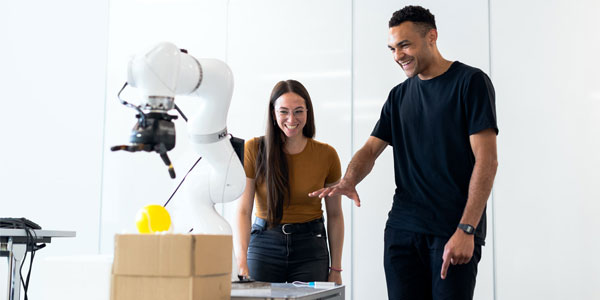The postgraduate blueprint for a future that works
- Wits University
Register for postgraduate study at Wits University and be part of the future of exciting possibilities.

The imperative to wear many hats to solve problems and advance in every field needs a multidisciplinary approach, often in one turnkey role, which makes multiskilling the new multitasking in a multirole workplace. Postgraduate study is a powerful career enabler in this environment.
As Wits University law professor Tumai Murombo says: “The silos need to be broken down. We have reached a point where law is not law, engineering is not engineering, and science is not science.” Fields such as artificial intelligence (AI), robotics, machine learning and law are at the forefront of breaking down these silos to create future professions.
This reality validates the value of postgraduate study as we see professionals re-equip themselves to deliver on emerging demands. While roles such as technology ethicist, extinct species revivalist, weather control engineer and pharmaceutical artisan may sound more Spielberg than certain, the depth of honours, masters and doctoral study unlocks new careers.
Apply next-level machine learning
Operating deeply in the future forge of AI, robotics and machine learning, associate professor at Wits School of Computer Science and Applied Mathematics Dr Benjamin Rosman, says: “AI is the last big problem humans will ever solve and is the most important problem we can ever work on — this field is the convergence point to enable the future.”
Machine learning is the modern powerhouse of AI as it is about systems improving themselves based on the data within these systems. “It’s inherently about making predictions, and the reason you do that is to make better decisions. Every field is being touched by this technology and wherever you are, there is potential to bring in different ideas,” he says.
Wits postgraduate students are developing new algorithms and models with one student, for example, applying AI to detect invasive plant species. This level of problem-solving puts humanity in pursuit of new knowledge, says Rosman, who is also the director of the Robotics, Autonomous Intelligence and Learning Laboratory and the National E-Science Postgraduate Teaching and Training Platform.
Advance through progressive thinking
We are at the intersection of new technologies, says Rosman. “Many of our research students are hired to join research teams at large technology companies, which generally distinguish between research science positions and research engineering positions.” Banking, telecommunications and medical industries are further destinations for many of these postgraduates.
Murombo agrees with the view that technology is an enabler of new careers. He observes a stronger connection today between science and regulation from within his specialisation of environmental law, not only in hard sciences, but in social science areas of social justice and public decision-making.
In this shifting environment, he points out that universities are a platform to connect new knowledge and expertise with the area of work where people are needing these new skills. “We are at the point where science and technology must provide social solutions,” he says, adding that lawyers and those who develop policy and regulation need to understand the scientific ground.
Navigate new legal landscapes
The government would benefit from partnering with and mobilising the postgraduate process in the pursuit of a transition to a low-carbon economy, says Murombo.
He sees a marked opportunity for collaboration in the convergence between African mining, the fourth industrial revolution (4IR) and law and adds that academia is often driving change. Wits was the first university to offer a postgraduate degree in renewable energy law and is advancing to focus on extractive issues and sustainable methods in mining and sustainable development.
With a rise in the imperative to manage risk and ethics, a course such as the Wits energy law postgraduate programme is proving to be valuable to engineers and financiers alike. “In the near future we will have sustainability experts who are neither lawyers nor scientists, but are experts who know the law and policy, and are grounded in the sciences and research,” he says.
The speed of evolution to a multiskilled workforce is moving forward in quantum leaps. Universities are at the core of this convergence, both as enablers of future organisational and societal dynamics and to empower us to step onto this new ground with confidence.
Are you looking to upskill or reskill in a multidisciplinary way? Study your postgraduate degree at Wits University and be part of the future of exciting possibilities.
For more information visit www.wits.ac.za/postgraduate.

